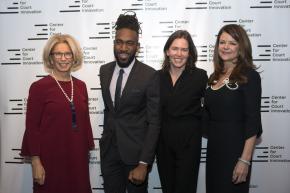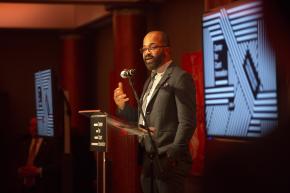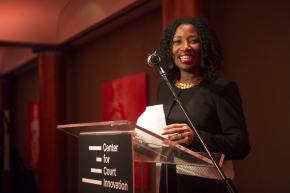
The Center for Court Innovation honors four leaders who have made New York a better place
Over 250 guests joined the Center for Court Innovation last night at a benefit celebrating justice reform and the accomplishments of four innovators from a variety of fields.
Proceeds from the benefit, which was held at The Rubin Museum of Art and emceed by actor and activist Jeffrey Wright, will help the Center continue its work to create a more effective and humane justice system.
The honorees were: MaryAnne Gilmartin of L&L MAG, who served on the Independent Commission on New York City Criminal Justice and Incarceration Reform; Sarah Williams and Propel Capital, who have pioneered an innovative approach to philanthropy; Quardean Lewis-Allen, who is offering new opportunities for disconnected young people through his nonprofit, Made in Brownsville; and Janet DiFiore, chief judge of the New York State Unified Court System, who is exploring new ways to address pressing issues like the opioid crisis and increasing access to justice for all New Yorkers.

Master of ceremonies Jeffrey Wright introduces the evening’s speakers.
“The Center for Court Innovation is about … helping folks at risk, folks in marginalized communities rewrite the narratives of their own stories, to break out of loops that lead to incarceration … so that they lead to more productive and full lives,” said Wright, the Tony- and Emmy Award-winning actor who currently stars in the HBO series Westworld.
He noted that the Center has “many identities” based on its wide variety of programming, including initiatives to combat violence, improve quality of life, and influence policy.
Former Chief Judge Jonathan Lippman introduced DiFiore, who two years ago succeeded him as New York’s most powerful jurist. “I sleep well at night, knowing that the judiciary is in such good hands,” he said before going on to detail innovations DiFiore has introduced or expanded, including Legal Hand, which trains volunteers to provide free legal information and referrals in some of New York’s most vulnerable neighborhoods and the first opioid intervention courts in the U.S., including one in the Bronx in collaboration with Bronx Community Solutions.
Emcee Jeffrey Wright and honorees Janet DiFiore, MaryAnne Gilmartin, Sarah Williams Quardean Lewis-Allen take the podium at "Celebrating Innovators."
DiFiore said the Center and its staff “deserve enormous credit for the work they do and for partnering with us to make our courts and the entire justice system smarter, more effective, and, most importantly, more humane.”
Greg Berman, director of the Center for Court Innovation, introduced Gilmartin and Williams. He praised Gilmartin for making significant contributions to the Independent Commission on New York City Criminal Justice and Incarceration Reform and her “impeccable, unflappable sense of professionalism.” And he thanked Williams for providing more than money through her social impact investing firm but also “ideas … connections … and a commitment to helping us accomplish our goals no matter how difficult they are.”
Gilmartin called the Center “a remarkable group of change agents, wall breakers, and compassionate advocates.”
Williams called the Center “a true laboratory, giving people the room to experiment and run with ideas. … It’s one thing to call for change and entirely another to get people and systems to rebuild the way justice happens in this country.”

Victoria Pratt, chair of the Center for Court Innovation's Advisory Board, introduces Jeffrey Wright as "a fierce advocate for reform."
Lewis-Allen was born in Brownsville but rather than seek his fortune elsewhere, as so many others have done, he returned to the community to establish Made in Brownsville. “I was given one narrative and I think I’m slowly chipping away at that narrative,” he said. Instead of being a neighborhood that young people aspire to escape, his goal “is to make Brownsville a place that measures success in our ability to give back to it.”
Among those in attendance were Manhattan Borough President Gale Brewer, City Councilmember Brad Lander, City Councilmember Keith Powers, Manhattan District Attorney Cyrus Vance, Bronx District Attorney Darcel Clark.
The award recipients talk about their work and their partnerships with the Center for Court Innovation.

